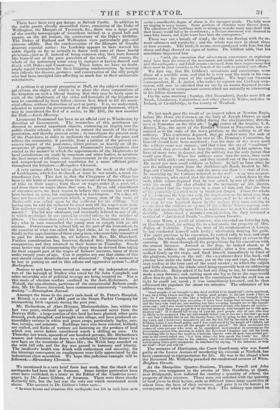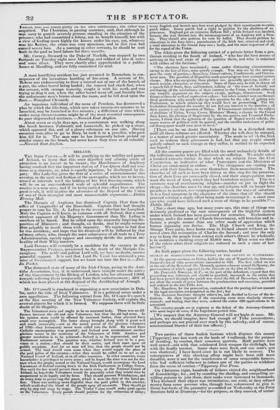We last week gave the result of an inquest taken
at Newton Regis, before Mr. Hunt, the,Coroner, on the body of Joseph Glover, an aged man, who was unfortunately killed during the electioneering disturb- ance at Nuneaton on the 21st ult."' In Ac course of the inquiry, S. S. Baxter, Esq., the agent of Sir EardierWilmot at Nuneaton, was ex- amined as to the state of the town previous to the calling in of the military. This gentleman deposed, that pa violent were the mob at one time, that had it not been for two of Mr. Hemiug's Committee, he himself should have been murdered; that the state of the town until the soldiers came was riotous ; and that when the cry of " coalition" was raised, they proceeded to beat the voters ; and, in his opinion, the lives of many were in danger, and the military was the only power that could save them. When the soldiers came into the town, they were assailed with sticks and stones, and they trotted out of the town again. He never saw men assail soldiers so before. In half an hour after, he saw the military return from the Attleborough Road, headed by Mr. Inge and Colonel Newdigate, and the town was then in a state of riot. In summing up, the Coroner referred to the evid i-ee of two respect- able witnesses, who stated that the deceased \vas • .ocked down by the mob, while others deposed that he was struck by one of the soldiers %vial his sword. He also alluded to the testimony of Mr. Baxter, who ili dared that the town was in a state of riot, and that the lives of the peaceably disposed were in imminent danger. From the whole of tb:t evidence, the Coroner said, the impression on his mind was, that the deceased was neither struck nor attemnted to be struck at all; :tut iLat he %vas knocked down by the mei) as they were running to eSC:IpC frG/II the soldiers, or 1.y one of the soldiers' horses coming sud- denly and unexpectedly upon him, in which case he met his deaths acci- dentally. After about a minute's considaation, the Jury returned a verdict of " Accidental Deatb."—Birmingfianz Gazette.
George Wren, a youth of nineteen, was executed on Saturday last, at Horsham Gaol, for setting fire to a hay-stack, the property of -Mrs. Fuller, of Uckfield. From the time of his condemnation at Lewes, he had conducted himself with levity ; obstinately denying his guilt. The night previous to his execution, he retired early to rest, and slept soundly the whole night, until awakened by the turnkey at seven in the morning. He went through all the preparations for his execution with the utmost firmness. Arrived at the drop, be looked about, as if anxious to address the persons assembled ; after a few seconds, he walked firmly up the steps, and fixed himself immediately in front of the platform, leaning on the rail : the executioner drew him back, and placing him under the fatal beam, put on the cap and rope, the clergy- man reading at the time part of the usual service ; to which the culprit paid little attention, his whole mind beingapparendy bent on addressing the multitude. Being asked if he had any thing to say, be immediately made a step forwarsl, and, resting upon one leg as far as the rope would. allow him to get, he complained to the executioner that the cord was so tight he could not speak ; it was immediately loosened, and he then addressed the populace for about ten minutes. The substance of his address was this- " Good people—I am brought to this fatal scaffold to be murdered l—to be mutdered. I say, fora thing I know nothing of. Listen, good people, to the last wordt, I have to say, for I am brought to this like a bullock to the siaughter—I am brought to this ignominious end through false swearing—I have been before that tribunal, the,dudge and the Jury who tried me, and nothing but false swearing brought me to this ignomi- nious end ; and I now stand before that awful tribunal of God, who knows all secrets— and what must those poor people feel at the last moment, who brought me to this igno- minions cud ? If it should fell to any of your lot, good people, any of you, who may be likely to be suspected like me who stands before you, if you see a fire don't go near it—not that I should like to see the county burn—but, by going to this tire, and fetch- ing water, and I tried every measure to put out the fire, but by the track of my shoe in fetching water, I was found guilty. and I was condemned by the people of Uckfleld, but God forbid I should accuse all the people of that parish." Ile then mentioded the names of some per.ons who were, as he considered, instrumental in carrying'on the prosecution itgaiust him, previous to which the Reverend Chaplain put out his hand, beseeching him to leave the world in Christian charity with all men, but several per- sons in the crowd called out, " Let him alone—let hint speak the truth," After going on a considerable time in his address, which was throughout very unconnected. and at many times quite incoherent, he concluded by saying, '‘ I die innocent, So help me God !—Fare you well all."
The sentence of Harrington, the Coast Guard-man, who was found guilty at the Lewes Assizes of murdering his comrade at Ninfield, has been commuted to transportation for life. He was in the chapel when. the Reverend Mr. Witherby preached the condemned sermon of Wren. Brighton Gazette.
At the Shropshire Quarter-Sessions, Thomas Powell. and John Haynes, two waggoners in the service of Mrs. Goodwin, at Quint, near Bridgnorth, were indicted for stealing a quantity of wheat, the property of their mistress. These men, not satisfied with the quarnity of food given to their horses, stole at different times large qnantities of wheat from the barn of their mistress, and gave it to the•horses ; in consequence of which two of them dicil • The robbery wa's traced to Voweii, who was found guilty on Ins own confession ; the other was acquitted. The Chairman, in passing sentence, said, that although he was sorry to punish severely persons standing in the situation of the prisoner' who had committed a felony, not to benefit himself, but with a view of feeding more highly the horses under his cure, yet, whatever was. his ',wave, the crime was very atrocious, and in this ease had scaused severe loss. . As a warning to other servants, be should be sent back to the gaol to hard labour for three months.
:Mr. Corney,.Steward to the Duke of Norfolk, was stopped by two footpads on Tuesday night near Mandling, and robbed of two SL notes end some silver. They were shortlyafter apprehended in a public- house at Maudling, and are fully committed for trial. •



















 Previous page
Previous page